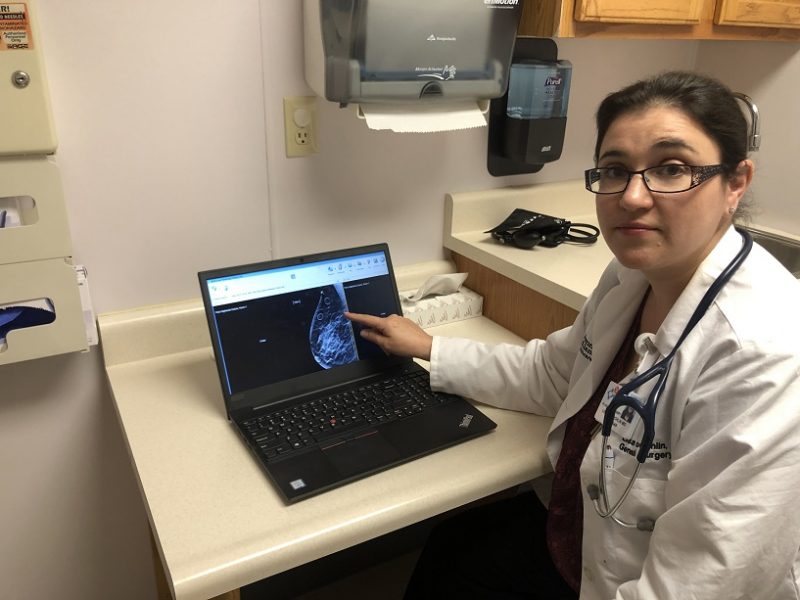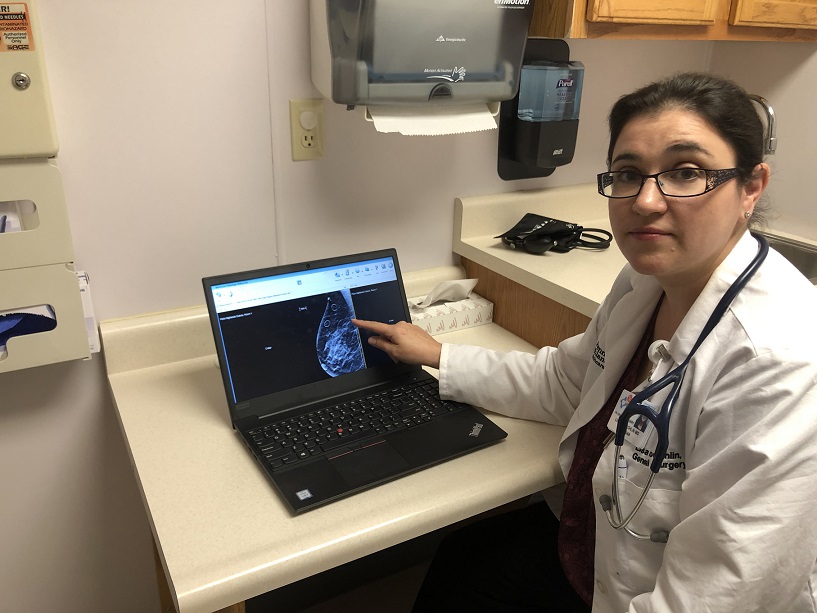
Enhancing your awareness about breast cancer can help save lives. Breast cancer is an abnormality in the growth of cells involving breast tissue, which can affect both women and men.
About one in eight U.S. women will develop invasive breast cancer over the course of her lifetime, and in Pennsylvania, over 12,000 new cases of female breast cancer are estimated to be diagnosed in 2019.
How do I reduce my chances of developing breast cancer?
Most breast cancer is “sporadic,” which means it is not linked to a gene passed down from a parent. That’s good news, because that means there are things you can change.
Maintaining a healthy weight, exercising regularly, avoiding estrogen exposure (from contraceptives and hormone replacement therapy) and reducing alcohol consumption are all factors shown to help reduce risks.
For younger women, having a first pregnancy before age 30 and breastfeeding any children, can also reduce breast cancer risks.
Unfortunately, there are also risk factors you can’t change. Being a woman, your ethnicity, getting older, your reproductive history (starting menstrual cycles before age 12, having menopause after age 55, if you have borne children, the number of children borne and the age when you had them), having dense breast tissue, having a personal or family history of breast cancer, having a personal history of certain non-cancerous breast diseases, having a personal history of radiation therapy to the chest before age 30 and having a genetic mutation in BRCA 1 or 2 genes, all play a role in a person’s risk of developing breast cancer.
While some risk factors can be changed by changing your behaviors, early detection with mammograms is strongly recommended for women to reduce the risks of developing advanced breast cancer.
Who should have a screening mammogram?
For average-risk women, the American Cancer Society and the Penn Highlands Healthcare Breast Program recommend screening mammograms be offered to women starting at age 40, and screening mammograms should be obtained every year.
Women who have a family history of breast cancer in a parent, sibling or child, or who have a BRCA gene mutation, are considered higher than average risk and may need screening mammograms on a modified schedule and or may need enhanced screening with a breast MRI.
Make sure your family physician is aware of any relevant family history of cancers.
I’m hearing about 3D mammograms. Do I need that?
Tomosynthesis, also called 3D mammography, is a technique which is combined with standard mammograms to give a more detailed view of the breast tissue, and it is very helpful when screening dense breast tissue.
Dense breast tissue is more common in younger women, and dense or very dense breast tissue (present in 50 percent of women) makes it harder to identify cancer on mammograms.
Since 2013, Pennsylvania requires women to receive notification of their mammographic breast density. If you have been told you have dense breast tissue on a prior mammogram, please discuss it with your family physician, and you may choose to add tomosynthesis to your annual screening mammograms.
Mammography with tomosynthesis is currently available at Penn Highlands DuBois, Penn Highlands Elk and Penn Highlands Huntingdon locations, and Penn Highlands Healthcare is currently evaluating the purchase of additional 3D mammography units to be installed across the healthcare system.
I have a problem with my breast. How do I get screened?
People with breast masses, pain, nipple discharge, skin changes or other breast problems may require different mammographic techniques (called diagnostic mammograms) and or ultrasound for evaluation. Please bring any concerns to your family physician to evaluate.
An abnormality was found on my imaging. What happens next?
Some abnormalities can be followed with future imaging, or you may be recommended to have a biopsy of the area.
Depending on the type of abnormality, a biopsy can be performed with ultrasound guidance or using mammography with stereotactic guidance.
Removal of the area may need to be performed in certain circumstances in the operating room by a surgeon.
Where can I go to have my testing or see a surgeon?
Penn Highlands offers the community a full range of breast care services.
Screening and diagnostic mammography is provided at all Penn Highlands hospitals and imaging departments: PH Brookville, PH Clearfield, PH DuBois, PH Elk, PH Huntingdon, and in Phillipsburg at the Moshannon Valley Community Medical Building.
3-D mammography is available at the PH DuBois, PH Elk and PH Huntingdon locations.
Breast biopsies with ultrasound-guidance are available at PH Clearfield, PH DuBois, PH Elk and PH Huntingdon locations, and stereotactic breast biopsies are offered at the PH DuBois, PH Elk and PH Huntingdon locations.
Surgeons with expertise in breast surgery are available for consults regarding breast problems, abnormal mammograms or biopsy results and breast cancer.
Appointments can be scheduled with an experienced surgeon at multiple locations throughout the Penn Highlands Healthcare system including offices in Clearfield, DuBois, Phillipsburg, Punxsutawney and St. Marys.



